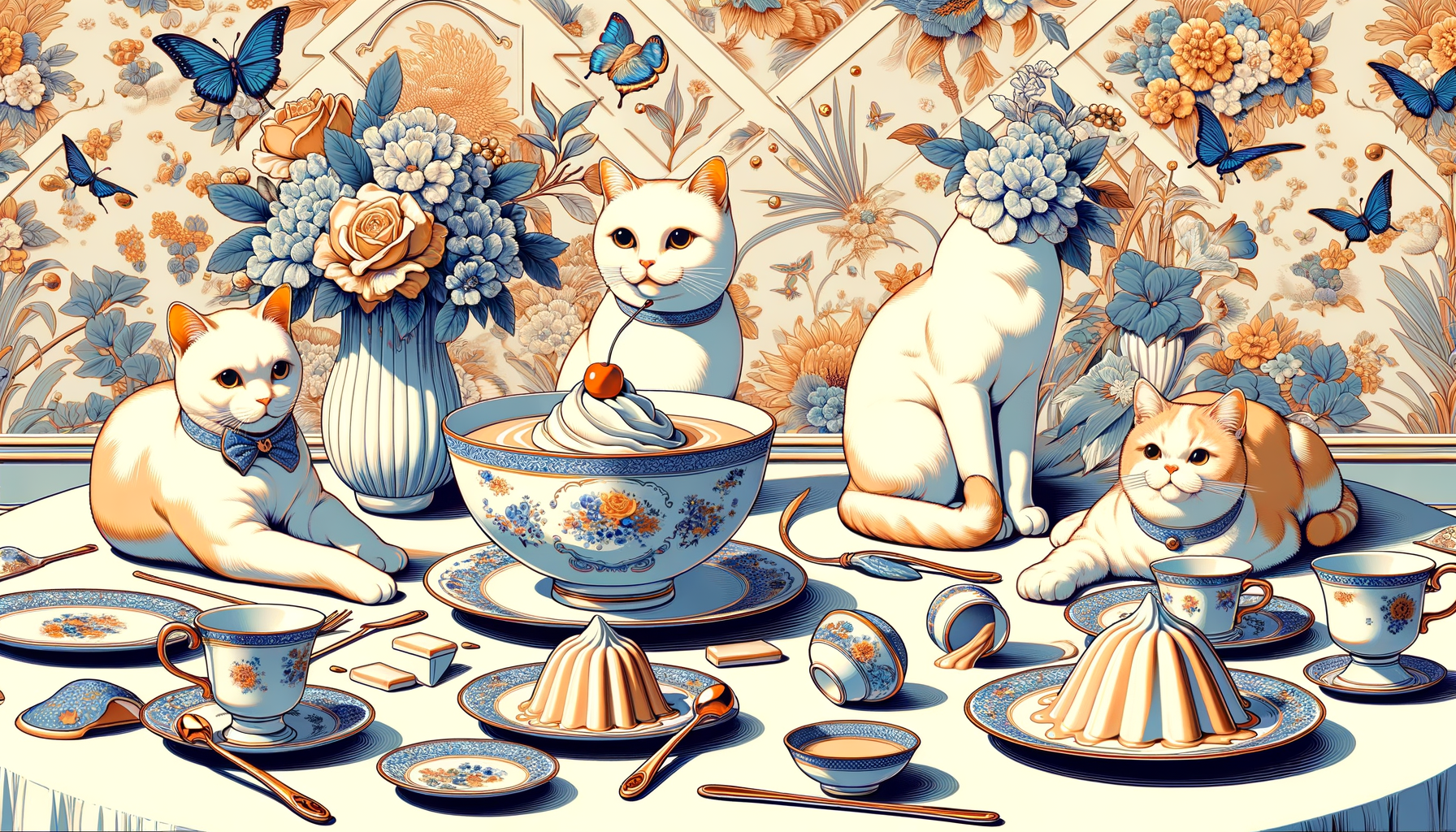There’s this story my dad tells every single time he gets the smallest invitation. We’ll be mid-conversation about something completely unrelated—say, where to buy fresh baguettes—and out it tumbles. “Did I ever tell you about your great-uncle Gérard and the cat?” Spoiler: yes, Dad, you have. But of course, the details shift with each retelling, his dramatic pauses longer, the embellishments sharper (“And then—get this, Juliette—the cat figured out how to open the door! No opposable thumbs, but voilà, out it went, like magic!”).
At some point, after hearing it several dozen times, you start to wonder: why this story? Why is Gérard’s Houdini cat the hook for so many family conversations? The answer, I think, lies in the glue that holds families together: shared lore.
Every family has their own patchwork of oddball characters, wildly retold tales, and traditions stuffed with inside jokes. Mine just happens to involve a wildly independent cat and barely believable anecdotes I could probably recite verbatim in both English and French at this point.
But these stories are more than entertaining dinner-table filler—they’re tiny mirrors, reflecting who we are, where we come from, and the cracks in our shared humanity. They shape us, sometimes in ways so subtle we hardly notice. So, let’s pour a cup of tea (or a glass of wine, let’s not kid ourselves), and let me share a few family stories that taught me about life, love, and the occasionally absurd beauty of human connection.
Meet My Grandmother, the Original Drama Queen
Growing up, my grandmother, Françoise, was the queen of theatrics. She didn’t just tell stories—she performed them. A simple tale of making crêpes (“thin as whispers,” she would remind me) could turn into a vibrant 20-minute monologue about the time she accidentally invited her butcher over for dinner instead of her hairdresser.
Her pièce de résistance, however, was the story of how she met my grandfather. “I hated him,” she would announce with her signature flair. “Imagine! A man so full of himself, he waltzed into MY favorite café, ordered a coffee, and completely ignored me!” Naturally, this detail would be followed by a juicy revelation: Grandpa Henri absolutely knew she was glaring at him from behind her book, and yes, he was pretending not to notice.
To hear Françoise tell it, their relationship was a slow burn, full of misunderstandings straight out of a rom-com. She was the Debbie Reynolds to his Gene Kelly. A war of witty banter, misunderstandings, and cups of espresso until the day he threw her off balance by quoting Victor Hugo.
“Do you know what Henri said to me?” she’d insist, her voice theatrical, her finger pointed in the air. “‘Que la vie était pauvre sans toi.’ Life was poor without you.”
And voilà, that was that. The stubborn café gremlin fell for the cocky regular.
Lesson learned? Love doesn’t always announce itself with a bouquet of roses. Sometimes, it starts with annoyance. And that goes double for dating—our imperfections and quirks can be the very things someone else finds worth falling in love with. So, maybe don’t swear off someone who misspells “you’re” on a first date. They might just charm you in Act Two.
The Case of the Pudding War
If my grandmother taught me about love, my great-aunt Lucille taught me about conflict. Or rather, how to survive it.
Lucille and my great-uncle Raymond shared the kind of marriage that could be described as “spirited.” Their arguments were famous family lore. But their most iconic spat? A heated debate about pudding. Vanilla or chocolate? Which was superior? (Reader, the answer is obviously chocolate, but I digress.)
It started harmlessly enough during a family picnic, but soon, the entire gathering was dragged into the fray. “Lucille is right; vanilla is for cake!” my mom argued, earning her an enthusiastic high-five from Lucille. Meanwhile, Raymond, with all the gravitas of a litigator defending an airtight case, said, “Vanilla is classic, and your taste buds cannot be trusted if you refuse to acknowledge that.”
This pudding debate escalated into a full-on “war,” with desserts swapped and sabotaged for weeks. (Lucille once baked an innocent-looking meringue pie, only to reveal she’d sneakily dyed the filling neon green as revenge for Raymond finishing the last pudding cup.) When the joke finally wore thin, Lucille and Raymond declared peace by splitting a pudding. Half vanilla, half chocolate.
It was glorious. Also? A total metaphor for relationships. Sometimes it’s not about who’s right. It’s about figuring out a way to share the damn pudding. Because compromise, however imperfect, is often sweeter than winning.
Why Feeding Stray Cats is Risky Business
Then there’s Gérard, the family wildcard. Gérard was what you’d call “eccentric” if you were feeling generous. He lived in a ramshackle one-bedroom apartment in the suburbs of Montreal, where he apparently collected vinyl records and stray cats with the same reckless enthusiasm.
The most famous of these strays was Félix, a sleek, mysterious gray cat that arrived one winter night and proceeded to take over Gérard’s life. Félix was clever—frighteningly so. He not only figured out how to open doors but also trained himself to knock salt shakers off shelves whenever Gérard ignored him.
Here’s the thing, though: Félix was never really Gérard’s pet. Not truly. That cat came and went as he pleased, disappearing for days only to return looking smug and well-fed. “A lesson in non-attachment,” my dad would joke, eyes twinkling as he reached for the wine.
But it was more than that, wasn’t it? Félix represented those wild, untamable parts of life that we try so hard—and often fail—to control. Relationships are no different. Not everyone we love will stay. Not every connection needs to be permanent to matter. And maybe, just maybe, some people (and cats) are meant to drift in and out of our lives, leaving us wiser, softer, and perhaps just a little saltier in their wake.
Putting It All Together
So what do pudding wars, dramatic matriarchs, and Houdini cats have to do with navigating modern-day relationships? Quite a lot, actually.
-
Be Yourself, Even If You Feel Like a Hot Mess: My grandmother’s meet-cute could have been a disaster if Henri hadn’t laughed at her glowering and seen beyond her drama. Embrace your quirks—they’re the gems someone’s looking for.
-
Compromise, Even When It’s Annoying: Whether it’s pudding or the thermostat setting, the ability to meet someone halfway is vital. Everyone’s vanilla to someone else’s chocolate.
-
Let Go When You Need To: Gérard loved Félix, but he respected that the cat’s nature was to wander. Not every connection is meant to last forever, and that’s okay. Respect the ebb and flow of relationships.
Family stories are rarely clean-cut lessons. They’re messy, full of gaps and exaggerations, but that’s what makes them memorable. They teach us not only about those who came before us but also about how to better navigate our own lives—and loves.
So, the next time you’re sitting around trading tales with your family, pay attention. You might just find the punchline to your own life story. Or, at the very least, you’ll hear about a cat opening a door—because trust me, those stories always find their way back.




















